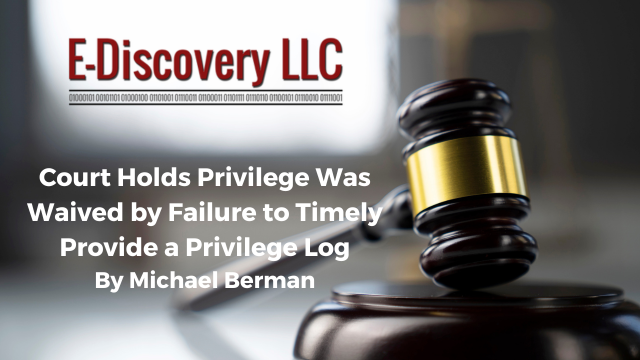
[EDRM Editor’s Note: The opinions and positions are those of Michael Berman.]
Many decisions state that the failure to timely provide an adequate privilege log may result in a waiver of the privilege. However, frequently they hold that there is no waiver on the facts presented.[1]
In Bautech USA, Inc. v. Resolve Equip., Inc., 2024 WL 1929486 (S.D. Fla. May 2, 2024), untimely privilege logging did have that harsh result on the facts presented.
The Bautech court wrote: “Based on its failure to timely provide a privilege log in accordance with the Court’s Local Rules, I find that PNI has waived its privilege as to the documents on its privilege log created prior to the commencement of the action on April 13, 2023.” [emphasis added].
One takeaway from Bautech is that, if a party makes a rolling production, it should discuss in a Rule 26(f) conference when privilege logs must be provided and, absent agreement, seek a protective order.
Michael Berman discussing Bautech USA, Inc. v. Resolve Equip., Inc., 2024 WL 1929486 (S.D. Fla. May 2, 2024).
One takeaway from Bautech is that, if a party makes a rolling production, it should discuss in a Rule 26(f) conference when privilege logs must be provided and, absent agreement, seek a protective order.
The procedural history was unremarkable. PNI objected to discovery in part by asserting several privileges. Id. at *1. PNI was making a rolling production and following the first production in February, “Resolve’s counsel requested that PNI provide a privilege log. However, no privilege log was provided. PNI continued to make rolling production of additional tranches into April 2024.”
The issue came to light, as it frequently does, circuitously. After document was used in a deposition, PNI sought a “clawback” under the ESI Protocol. Apparently, Resolve (the recipient) did not agree because it asserted that PNI was improperly withholding the communications. In other words, it challenged PNI’s assertion of privilege.
PNI notified the court of the dispute and the court directed the parties to file a status report. The court wrote that:
PNI did not provide Resolve with its privilege log until April 25, 2024, shortly before the joint status report was due.
Bautech USA, Inc. v. Resolve Equip., Inc., 2024 WL 1929486 (S.D. Fla. May 2, 2024).
That delay resulted in waiver of the privilege under the court’s Local Rule 26.1(e)(2), which required serving a privilege log within 14 days of production. The court stated:
PNI was obligated to produce its privilege log within 14 days of the production from which it had withheld documents. This production began in February 2024. Yet, despite Resolve’s repeated requests, PNI did not produce a privilege log for another two months – and even then, only after Resolve had requested a discovery hearing and on the afternoon of the day the parties’ positions on the dispute were due to the Court. I recognize that PNI has produced multiple tranches of documents more recently than February. However, PNI could not identify from which tranche the documents on the privilege log produced on April 25, 2024, were withheld. The fact that PNI did not produce any privilege log (even a preliminary one to be supplemented as additional tranches were produced) within 14 days of its February production – or at any time for another two months despite repeated requests – undermines an inference that all of the privileged documents were only just discovered as part of the latest tranche. [emphasis in original].
Bautech USA, Inc. v. Resolve Equip., Inc., 2024 WL 1929486 (S.D. Fla. May 2, 2024).
The court added:
Failure to timely provide a privilege log in accordance with the Local Rules constitutes a waiver of the asserted privileges for those documents subject to the privilege log requirement. [emphasis added].
Id.
It noted that waiver is a “harsh sanction,” however:
The timely production of a privilege log is meant to surface disputes over privilege early in the discovery period in order to give the parties (and, if necessary, the Court) time to resolve them. As it stands, the discovery period in this case expires on June 5, 2024 (a date the parties jointly requested approximately a month ago)…. By failing to serve a privilege log until after Resolve had requested a discovery hearing, with little more than a month before the extended discovery deadline, PNI has left the parties and the Court little time to resolve an assertion of privilege, the merits of which will involve a close examination over multiple overlapping doctrines and potentially the need to find facts regarding the relationships between Bautech, PNI, and Beacon at different times. Moreover, the delay prejudices Resolve as it attempts to complete depositions and other discovery without the benefit of documents to which it may be entitled. Therefore, given the extended delay in PNI producing its required privilege log, I find that deeming a waiver of privilege over those documents listed on the log that were created prior to commencement of this action on April 13, 2023, is appropriate. [emphasis added].
Id.
However, under the Local Rules, no privilege log is required for work product created after commencement of the action. Therefore, as to those materials, there was no waiver.
Notes
[1] “Absent consent of the adverse party, or a Court order, a privilege log (or other communication of sufficient information for the parties to be able to determine whether the privilege applies) must accompany a written response to a Rule 34 document production request, and a failure to do so may constitute a forfeiture of any claims of privilege.” Mezu v. Morgan State Univ., 269 F.R.D. 565, 577 (D. Md. 2010); see, e.g., Court Excused Party From Waiver by Failure to Provide Specific Objections (Aug. 7, 2022); How Much Detail is Enough in a Privilege Log? (Apr. 9, 2024); Privilege Logs: New Techniques to Achieve Proportionality – The “Certification Log” (Mar. 4, 2024).


